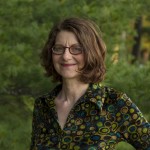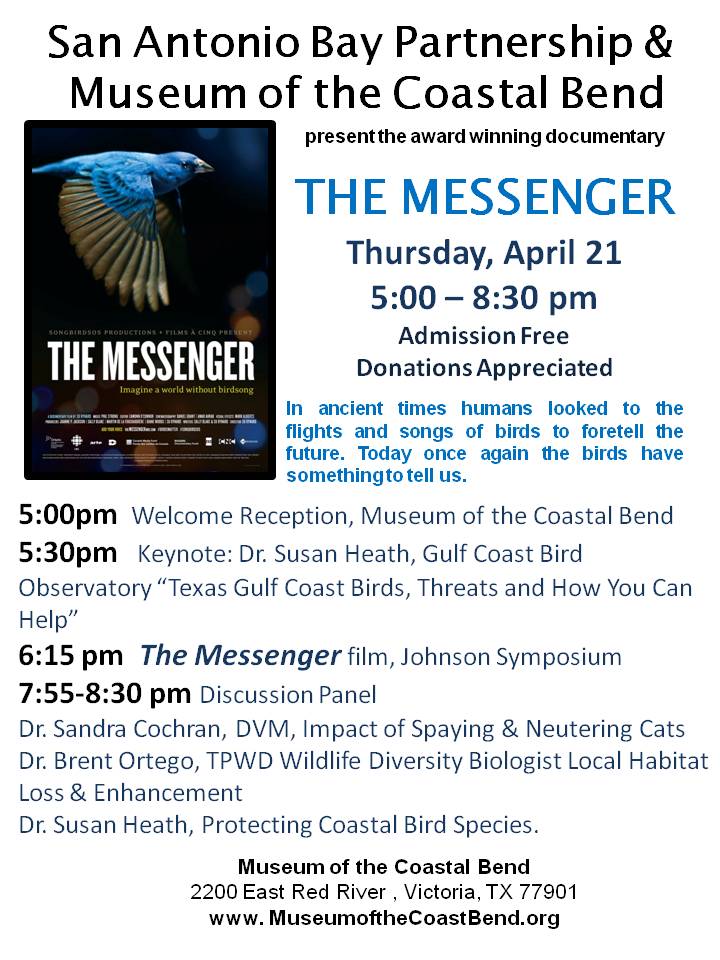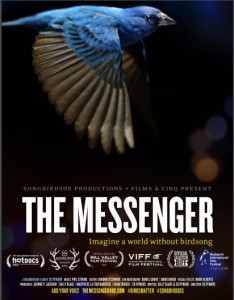In collaboration with the Museum of the Coastal Bend at Victoria College, San Antonio Bay Partnership provide the screening of the acclaimed documentary The Messanger on Thursday evening, April 21, 2016. Regional birding experts spoke about the impacts and solutions for local issues with audience participation. The event was provided free of charge.
Click here to view Movie Trailer
Can you imagine a world without birdsong?
The Messenger, a new documentary by award-winning filmmaker Su Rynard (Dream Machine, Kardia) chronicles the struggle of songbirds worldwide to survive in turbulent environmental conditions brought about by humans and argues that their demise could signify the crash of the ecosystems globally, akin to the disappearance of honey bees and the melting of the glaciers.
Su Rynard’s wide-ranging and contemplative documentary the messenger explores our deep-seated connection to birds and warns that the uncertain fate of songbirds might mirror our own.
Moving from the northern reaches of the Boreal Forest to the base of Mount Ararat to the urban streets of New York. the messenger brings us face-to-face with a remarkable variety of human-made perils that have devastated thrushes, warblers, orioles, tanagers, grosbeaks and many other airborne music-makers. These include hunting, light pollution, high-rise collisions, pipelines, pesticides and loss of migratory habitats.
On one level, the messenger is the artful story about the mass depletion of songbirds on multiple continents, and those who are working to turn the tide. On another level, the messenger is a visually stunning emotional journey, one that mixes its elegiac message with hopeful notes and unique glances into the influence of songbirds on our own expressions of the soul. For example, a German composer, DJ and bird-watching enthusiast, Dominik Eulberg incorporates bird-sounds seamlessly into techno music and introduces us to the use of birdsongs in Wagnerian opera.
The messenger extends our “bird’s-eye view,” with a fresh glimpse into their migratory journeys. As Dr. Martin Wikelski shares the wonders of new satellite technology that tracks individual birds over thousands of miles, and data visualizations elegantly create a glimpse into the otherwise unknown and unseen movements of birds.
We see culture clashes, as in France, where activists run up against hunters of the Ortolan Bunting, an endangered bird that is considered a traditional culinary delicacy. In the vast prairie lands of Saskatchewan, Dr. Christy Morrissey works to unravel the mystery behind the sharp drop in the numbers of farmland birds. She discovers that the smoking gun is likely the same pesticide that is killing honeybees.
We meet passionate and highly motivated people like Michael Mesure, founder of the Fatal Light Awareness Program, who has spearheaded the retro-fit of skyscraper glass with markers, significantly reducing the number of birds that die by colliding with buildings. And there is hope for a sustainable future, as Costa Rican coffee farmers learn from ornithologist Alejandra Martinez-Salinas about the benefits of pesticide-free shade-grown coffee. The diversity of shade trees provide a natural habitat for migratory songbirds and the birds’ appetite for destructive pests provides an alternative to agro-chemicals.
Ultimately, the messenger is about what the birds have to tell us about the state of our planet and our shared future. In the words of Boreal biologist Erin Bayne, “Could we live without birds? We don’t really know for sure… That’s one of the fundamental concerns when you play with nature, pull one piece out, and maybe that’s a pivotal piece, we just don’t know.”
 Director’s statement: Birds are humankind’s “early warning system,” and this was one of the inspirations behind the film. Since ancient times we have looked to birds to foretell the future. Changes in the flights or songs of birds can signal the coming of storms, the change of season, or the dawn of a new day. A decline in the numbers or health of birds points to changes in the environment. Now is a critical time for the world’s climate and ecosystems. Birds have something to tell us, and I wanted to amplify their message.
Director’s statement: Birds are humankind’s “early warning system,” and this was one of the inspirations behind the film. Since ancient times we have looked to birds to foretell the future. Changes in the flights or songs of birds can signal the coming of storms, the change of season, or the dawn of a new day. A decline in the numbers or health of birds points to changes in the environment. Now is a critical time for the world’s climate and ecosystems. Birds have something to tell us, and I wanted to amplify their message.
The Messenger takes viewers on a journey that chronicles the struggle of songbirds worldwide. The stakes are high, yet how do you unravel the story of the mass decline of birds without overwhelming people and making them feel helpless? How do you distill complex science into a story that is accessible and impactful? To achieve this we explore the deep human bond we humans have with birds. We share the awe, the music, the poetry, the beauty and the wonder. We connect with how amazing these creatures are. We reflect upon our complex modern human relationship to the natural world, examining how it is that we humans depend on birds and the work that they do. We come to understand how the fate of the songbird is inextricably linked to our own. The result is a deeply nuanced film. A film that will make you laugh and cry. A film that may change you. — Su Rynard

